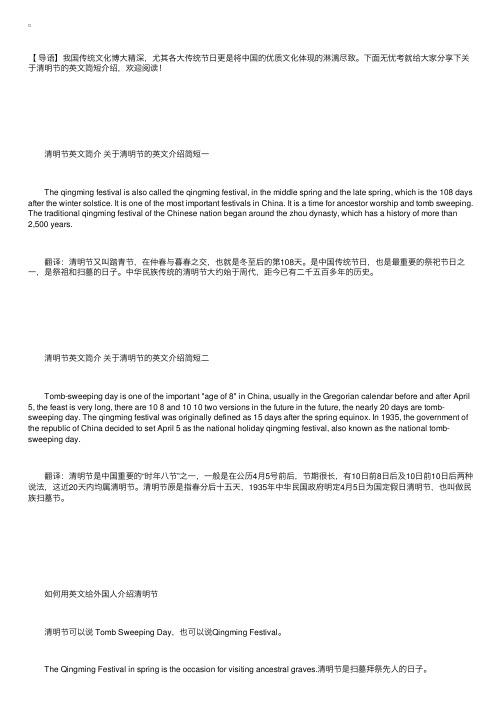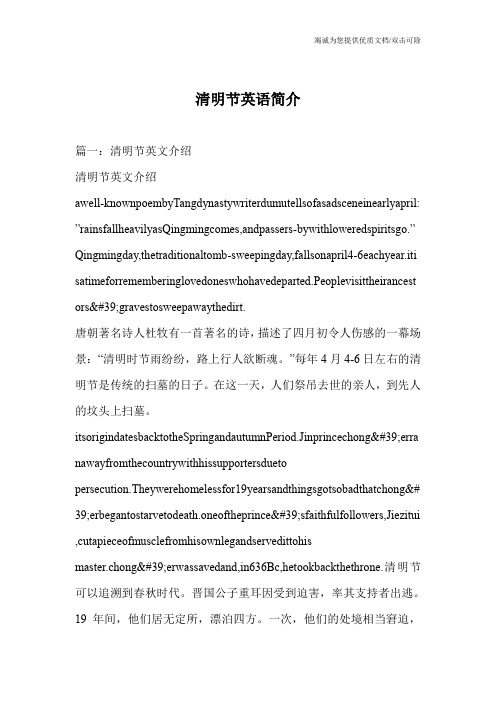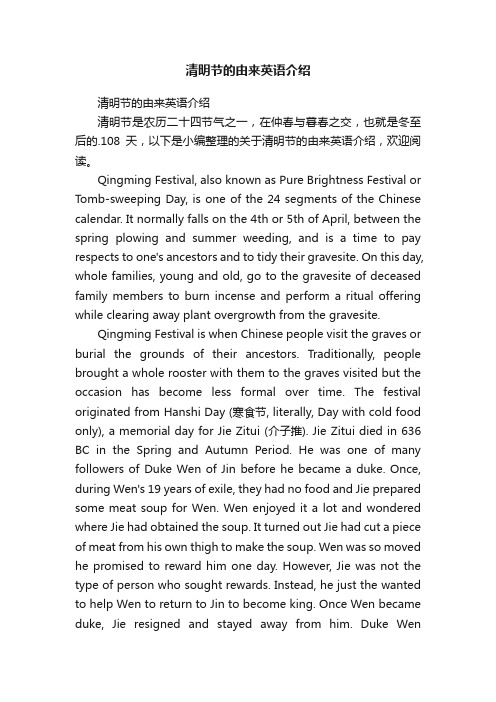清明节英文介绍
英语介绍清明节

英语介绍清明节English:Qingming Festival, also known as Tomb-Sweeping Day, is a traditional Chinese festival that falls on April 4th or 5th each year. It is a time for people to honor their ancestors by visiting their graves, cleaning the tombs, and making offerings of food and other items. This practice dates back over 2,500 years and is an important aspect of Chinese cultural heritage. In addition to paying respects to the deceased, Qingming Festival is also a time for people to enjoy the outdoors, fly kites, and indulge in traditional Qingming snacks like qingtuan and peach blossom porridge. The festival is also a time to reflect on the cycle of life and death, and to appreciate the importance of family and connections to the past.中文翻译:清明节,又称扫墓节,是每年4月4日或5日的中国传统节日。
这是一个向祖先致敬的时刻,人们会到坟墓上祭拜,打扫墓地,并献上食物和其他物品。
这一习俗可以追溯到2500多年前,是中国文化遗产的重要组成部分。
清明节英语介绍作文(通用25篇)

清明节英语介绍作文(通用25篇)1. 清明节(The Qingming Festival)The Qingming Festival, also known as Tomb Sweeping Day, is a traditional Chinese festival that is observed on April 4th or 5th of each year. The festival has a history of over 2,500 years and holds great significance in Chinese culture.During the Qingming Festival, people often visit the graves of their ancestors to pay their respects. They clean the gravesites, offer food and flowers, and burn incense as a way to honor the deceased. It is believed that by doing so, the ancestors will be blessed and their spirits will be at peace.Apart from tomb-sweeping activities, people also take part in various outdoor activities during this holiday. It is a popular time to go for a walk in the countryside, fly kites, and enjoy the beautiful spring weather. Some families even have picnics in the park or go on short trips to enjoy the sights and sounds of nature.In recent years, there has been a growing trend of using the Qingming Festival as an opportunity for cultural and ecological tours. People visit historical sites and scenic spots, appreciating the beauty of nature and learning about the country’s rich traditions.The Qingming Festival not only serves as a time for remembrance and paying homage to ancestors, but it also signifies the arrival of spring and renewal. It is a time for people to enjoy the beauty of nature, spend time with their loved ones, and reflect on the importance of family and heritage.2. 清明节的起源(The Origin of the Qingming Festival)The Qingming Festival, also known as Tomb Sweeping Day, can be traced backto the Zhou Dynasty in ancient China. It is believed that the festival was initially a time for people to worship and remember their ancestors.During the Zhou Dynasty, people began to bury their deceased family members in tombs instead of practicing cremation. They believed that the souls of the deceased would continue to exist in the afterlife, so they wanted to ensure that their loved ones had a proper resting place.As time went on, the Qingming Festival became an important way for people to honor their ancestors. The custom of tomb sweeping started during the Tang Dynasty and has been passed down through generations.The origin of the festival can also be linked to the ancient observance of nature. The Qingming Festival falls in early spring when the weather starts to become warm,and nature begins to revive. People took this opportunity to go outside and appreciate the beauty of the blooming flowers, fly kites, and enjoy outdoor activities.3. 清明节的习俗(Customs of the Qingming Festival)The Qingming Festival is a time when people engage in a variety of customs to honor their ancestors and enjoy the arrival of spring. Here are some common customs associated with this traditional Chinese festival:3.1 Tomb SweepingTomb Sweeping is the most significant custom during the Qingming Festival. People visit the graves of their ancestors to offer tributes, clean the gravesites, and burn incense. It is believed that by doing so, the spirits of the deceased will be at peace and ancestors will bless their descendants.3.2 Spring OutingsSpring outings are a popular activity during the Qingming Festival. This is a time when people take advantage of the pleasant weather and go outside to enjoy the beauty of nature. They often visit parks, gardens, or countryside areas to appreciate the blooming flowers, go for walks, and have picnics with family and friends.3.3 Flying KitesFlying kites is another traditional activity during the Qingming Festival. It is believed that kite flying can bring good luck and drive away evil spirits. People of all ages take part in this activity, with colorful kites filling the sky and adding to the festive atmosphere.3.4 Eating Qingming CakesQingming cakes, also known as green rice balls or pure-bright pastries, are a special treat during this festival. They are made using glutinous rice and different fillings such as red bean paste or nut mixtures. These cakes are eaten to symbolize the arrival of spring and the bright future ahead.These are just a few examples of the customs associated with the Qingming Festival. Each region in China may have its unique customs and traditions, but the underlying spirit of remembrance, respect, and celebration is shared nationwide.4. 清明节的重要意义(The Significance of the Qingming Festival)The Qingming Festival holds great importance in Chinese culture and has several significant meanings. Here are a few key reasons why the festival is celebrated and cherished:4.1 RemembranceFirst and foremost, the Qingming Festival is a time for people to remember and honor their ancestors. By visiting their graves, cleaning the tombstones, and making offerings, people show their respect and gratitude towards their deceased loved ones.4.2 Connection to NatureThe Qingming Festival also serves as a reminder of the connection between humans and nature. As the festival falls in early spring, it is a time when nature starts to come alive, and the weather becomes warmer. People take this opportunity to appreciate the beauty of nature, go for outings, and enjoy outdoor activities.4.3 Family ReunionThe Qingming Festival is a time for families to come together and spend quality time with one another. Many people take advantage of the holiday to travel back to their hometowns and visit their relatives. It is seen as a time for family reunion and strengthening family bonds.4.4 Cultural HeritageThe Qingming Festival is deeply rooted in Chinese history and traditions. It provides an opportunity for people to learn about and pass down their cultural heritage to the younger generation. Through the customs and activities associated with the festival, people gain a deeper understanding of their roots and the importance of preserving their traditions.The Qingming Festival is more than just a holiday; it is a time for reflection, reverence, and renewal. It brings together people from all walks of life to pay respect to ancestors, appreciate nature, and cherish the importance of family and cultural heritage.。
关于清明节的英文简短介绍

【导语】我国传统⽂化博⼤精深,尤其各⼤传统节⽇更是将中国的优质⽂化体现的淋漓尽致。
下⾯⽆忧考就给⼤家分享下关于清明节的英⽂简短介绍,欢迎阅读! 清明节英⽂简介关于清明节的英⽂介绍简短⼀ The qingming festival is also called the qingming festival, in the middle spring and the late spring, which is the 108 days after the winter solstice. It is one of the most important festivals in China. It is a time for ancestor worship and tomb sweeping. The traditional qingming festival of the Chinese nation began around the zhou dynasty, which has a history of more than 2,500 years. 翻译:清明节⼜叫踏青节,在仲春与暮春之交,也就是冬⾄后的第108天。
是中国传统节⽇,也是最重要的祭祀节⽇之⼀,是祭祖和扫墓的⽇⼦。
中华民族传统的清明节⼤约始于周代,距今已有⼆千五百多年的历史。
清明节英⽂简介关于清明节的英⽂介绍简短⼆ Tomb-sweeping day is one of the important "age of 8" in China, usually in the Gregorian calendar before and after April 5, the feast is very long, there are 10 8 and 10 10 two versions in the future in the future, the nearly 20 days are tomb-sweeping day. The qingming festival was originally defined as 15 days after the spring equinox. In 1935, the government of the republic of China decided to set April 5 as the national holiday qingming festival, also known as the national tomb-sweeping day. 翻译:清明节是中国重要的“时年⼋节”之⼀,⼀般是在公历4⽉5号前后,节期很长,有10⽇前8⽇后及10⽇前10⽇后两种说法,这近20天内均属清明节。
清明节中英文简介

• 清明节简介 brief introduction
But the Qingming Festival is not only a seasonal point to guide farm work, it is more a festival of commemoration. The Qingming Festival sees a combination of sadness and happiness.
谈到清明节,有点历史知识的人,都会联想到历史人 物介子推。据历史记载,在两千多年以前的春秋时代, 晋国公子重耳逃亡在外,生活艰苦,跟随他的介子推 不惜从自己的腿上割下一块肉让他充饥。
• 清明节起源 Origin
When the lord succeeded in becoming the ruler of a small principality, he invited his faithful follower to join him. However, Jie declined his invitation, preferring to lead a hermit's life with his mother in the mountains.
叁 清明节活动方式 activities
• 清明节活动方式activities
Tomb Sweeping扫墓
The major custom in Qingming Festival is tomb sweeping. People will set out offerings of food and paper money to their ancestors.
为了纪念介子推,晋文公下令每年的这一天,禁止生火,家家户户只能吃生 冷的食物,这就是寒食节的来源
关于清明节的英文文章

关于清明节的英文文章
English:
The Qingming Festival, also known as Tomb-Sweeping Day, is a traditional Chinese festival that falls on the 15th day after the Spring Equinox. During this festival, people pay respects to their ancestors by cleaning the tombs and offering them food, tea, and other necessities. It is also a time to enjoy the spring weather and spend time with family by going on outings and flying kites. In recent years, the festival has also become a time to cherish nature and promote environmental protection, as people use this time to plant trees and clean up the surroundings of the tombs.
中文翻译:
清明节,又称踏青节,是中国的传统节日,日期在春分后的第15天。
在这个节日里,人们通过清理祖坟和献上食物、茶和其他日常用品来尊敬祖先。
这也是一个享受春天天气、和家人出游放风筝的时候。
近年来,清明节也逐渐成为珍惜自然、倡导环保的时刻,人们利用这个时间种树和清理祖坟周围的环境。
介绍清明节英语作文优秀5篇

介绍清明节英语作文优秀5篇清明节的英语作文篇一Qingming Festival is a traditional Chinese festival and one of the 24 solar terms of the lunar calendar. On every tomb sweeping day, people will go to worship their ancestors and visit the tombs of revolutionary martyrs.This year#39;s Tomb Sweeping Day was cloudy early in the morning. After a while, there was a light rain in the sky. My grandfather, my second grandfather... My aunt, they all bought fruits, flowers and other sacrifices to go to the grave and sweep the grave for grandpa to express their nostalgia for their dead relatives.I once recited a poem called Qingming. Two of them are written like this, it rains one after another during the Qingming Festival, and pedestrians on the road want to break their souls. These two poems properly describe the special atmosphere of Qingming Festival.This special atmosphere makes people#39;s nostalgia linger in their hearts, makes people remember and carry forward the fine traditions of their predecessors, and encourages people to cherish the beautiful life now.清明节是中国的传统节日,也是农历24节气之一。
清明节英语简介

清明节英语简介篇一:清明节英文介绍清明节英文介绍awell-knownpoembyTangdynastywriterdumutellsofasadsceneinearlyapril:”rainsfallheavilyasQingmingcomes,andpassers-bywithloweredspiritsgo.”Qingmingday,thetraditionaltomb-sweepingday,fallsonapril4-6eachyear.iti satimeforrememberinglovedoneswhohavedeparted.Peoplevisittheirancest ors'gravestosweepawaythedirt.唐朝著名诗人杜牧有一首著名的诗,描述了四月初令人伤感的一幕场景:“清明时节雨纷纷,路上行人欲断魂。
”每年4月4-6日左右的清明节是传统的扫墓的日子。
在这一天,人们祭吊去世的亲人,到先人的坟头上扫墓。
itsorigindatesbacktotheSpringandautumnPeriod.Jinprincechong'erra nawayfromthecountrywithhissupportersduetopersecution.Theywerehomelessfor19yearsandthingsgotsobadthatchong&# 39;erbegantostarvetodeath.oneoftheprince'sfaithfulfollowers,Jiezitui ,cutapieceofmusclefromhisownlegandservedittohismaster.chong'erwassavedand,in636Bc,hetookbackthethrone.清明节可以追溯到春秋时代。
清明节的由来英语介绍

清明节的由来英语介绍清明节的由来英语介绍清明节是农历二十四节气之一,在仲春与暮春之交,也就是冬至后的.108天,以下是小编整理的关于清明节的由来英语介绍,欢迎阅读。
Qingming Festival, also known as Pure Brightness Festival or Tomb-sweeping Day, is one of the 24 segments of the Chinese calendar. It normally falls on the 4th or 5th of April, between the spring plowing and summer weeding, and is a time to pay respects to one's ancestors and to tidy their gravesite. On this day, whole families, young and old, go to the gravesite of deceased family members to burn incense and perform a ritual offering while clearing away plant overgrowth from the gravesite.Qingming Festival is when Chinese people visit the graves or burial the grounds of their ancestors. Traditionally, people brought a whole rooster with them to the graves visited but the occasion has become less formal over time. The festival originated from Hanshi Day (寒食节, literally, Day with cold food only), a memorial day for Jie Zitui (介子推). Jie Zitui died in 636 BC in the Spring and Autumn Period. He was one of many followers of Duke Wen of Jin before he became a duke. Once, during Wen's 19 years of exile, they had no food and Jie prepared some meat soup for Wen. Wen enjoyed it a lot and wondered where Jie had obtained the soup. It turned out Jie had cut a piece of meat from his own thigh to make the soup. Wen was so moved he promised to reward him one day. However, Jie was not the type of person who sought rewards. Instead, he just the wanted to help Wen to return to Jin to become king. Once Wen became duke, Jie resigned and stayed away from him. Duke Wenrewarded the people who helped him in the decades, but for some reason he forgot to reward Jie, who by then had moved into the forest with his mother. Duke Wen went to the forest, but could not find Jie. Heeding suggestions from his officials, Duke Wen ordered men to set the forest on fire to force out Jie. However, Jie died in the fire. Feeling remorseful, Duke Wen ordered three days without fire to honour Jie's memory. The county where Jie died is still called Jiexiu (介休, literally "the place Jie rests forever").。
- 1、下载文档前请自行甄别文档内容的完整性,平台不提供额外的编辑、内容补充、找答案等附加服务。
- 2、"仅部分预览"的文档,不可在线预览部分如存在完整性等问题,可反馈申请退款(可完整预览的文档不适用该条件!)。
- 3、如文档侵犯您的权益,请联系客服反馈,我们会尽快为您处理(人工客服工作时间:9:00-18:30)。
清明节英文介绍
the qingming (pure brightness) festival is one of the 24 seasonal division points in china, falling on april 4-6 each year. after the festival, the temperature will
rise up and rainfall increases. it is the high time for spring plowing and sowing. but the qingming festival is not only a seasonal point to guide farm work, it is more a festival of commemoration.
the qingming festival sees a combination of sadness and happiness.
this is the most important day of sacrifice. both the han and minority ethnic groups at this time offer sacrifices to their ancestors and sweep the tombs of the diseased. also, they will not cook on this day and only cold food is served.
the hanshi (cold food) festival was usually one day before the qingming festival. as our ancestors often extended the day to the qingming, they were later combined.
on each qingming festival, all cemeteries are crowded with people who came to sweep tombs and offer
sacrifices. traffic on the way to the cemeteries becomes extremely jammed. the customs have been greatly simplified today. after slightly sweeping the tombs, people offer food, flowers and favorites of the dead, then burn incense and paper money and bow before the memorial tablet.
in contrast to the sadness of the tomb sweepers, people also enjoy hope of spring on this day. the qingming festival is a time when the sun shines brightly, the trees and grass become green and nature is again lively. since ancient times, people have followed the custom of spring outings. at this time tourists are everywhere.
people love to fly kites during the qingming festival. kite flying is actually not limited to the qingming festival. its uniqueness lies in that people fly kites not during the day, but also at night. a string of
little lanterns tied onto the kite or the thread look like shining stars, and therefore, are called "god's lanterns."
the qingming festival is also a time to plant trees, for the survival rate of saplings is high and trees grow
fast later. in the past, the qingming festival was called
"arbor day". but since 1979, "arbor day" was settled as march 12 according to the gregorian calendar.。
